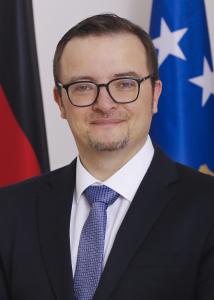Political mood
Kosovo has enjoyed stable government over the past four years, thanks to Prime Minister Albin Kurti achieving an absolute majority for the first time in elections in 2021. This made him the first prime minister in the country to govern for a full legislative term without early elections.
While his domestic policy record in education, healthcare, infrastructure and economic development was very manageable, he was able to score points with many Kosovars in terms of foreign policy thanks to his rigid, uncompromising stance in the dialog process with Serbia. From the point of view of many Kosovars, this enabled him to fulfill key election promises. After his election victory in 2021, he announced “reciprocity measures” towards Serbia. He was referring to complicating non-recognition procedures for identity documents and car license plates when Kosovars wanted to travel through Serbia. By applying the same measures to Serbia and escalations in northern Kosovo, he was able to ensure that these deliberately induced travel complications were no longer applied by Serbia. In addition, he was able to expand Kosovo's state authority in these areas by banning the Serbian dinar, among other things. In addition, the attack by Serbian paramilitaries in Banjska in September 2023 and the bomb attack on Kosovo's water and electricity supply at the turn of the year 2024/2025 proved him right in the eyes of many Kosovars that Serbia does not want an honest dialog and therefore Kosovo does not need to show any willingness to compromise.
The commitment signed by Kosovo since the Brussels Agreement in 2013 to establish a Serbian municipal union was delayed by Kurti's government, which ultimately refused to implement it, citing obstacles that were not part of the Western partners' demands.
The price for this is EU sanctions against Kosovo, which are still in force, and the sometimes massive loss of trust among Western partners in the EU and US, as Kurti often acted in a surprising and uncoordinated manner. The failed application to join the Council of Europe in 2024 was a direct consequence of this, as Western support was minimal.
This did nothing to diminish Kurti's popularity in Kosovo; if anything, it strengthened his position, as he was able to present himself as a lone fighter for the country's interests, even against the strongest international forces.
The opposition parties PDK, LDK and AAK, which dominated politics from independence until 2021, were unable to compete with Kurti, who is undoubtedly a master of using his populist and charismatic skills, with their agendas focused on Western allies, the economy, the rule of law and, in some cases, flat nationalism.
The full-length publication is only available in german.
Topics
Provided by
Foundation Office KosovoAbout this series
The Konrad-Adenauer-Stiftung is a political foundation. Our offices abroad are in charge of over 200 projects in more than 120 countries. The country reports offer current analyses, exclusive evaluations, background information and forecasts - provided by our international staff.




